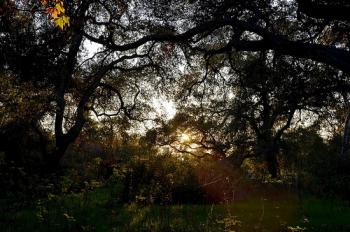Serendip is an independent site partnering with faculty at multiple colleges and universities around the world. Happy exploring!
Blogs
Finding Center
As I started my walk my definition of center and border changed. I began planning out my journey by choosing the Thomas cloisters as a geographic center and the areas near the roads surrounding Bryn Mawr as its borders. However, as I walked another interpretation of center popped into my head. Biologically, organisms clump themselves around where there are the most resources. Typically, there is the most life where there is the most water because most organisms need that to survive. Humans have partially removed themselves from this practice. Because we have tools that bring our necessities to us, we look to go to places that satisfy our social or academic needs. So, as an academic institution, the people of Bryn Mawr center themselves around the buildings where they have classes. The whole campus is set up with academics at the center. This is where the most activity happens on week days. Then, on the weekends, the center shifts to the dorms as students seek to fulfill their social needs. As the human mind is complex, an idea like center is more complex than mathematical proportions.
Center of Campus, Center of Life
When Henry David Thoreau wrote in “Walking,” “How womankind, who are confined to the house still more than men, stand it I do not know; but I have ground to suspect that most of them do not STAND it at all,” he must have been referring to Mawrtyrs. We have a keen ability to sit in hard chairs all day, perhaps in their carrels in Canaday or Carpenter or around a table in a classroom, pouring over textbooks or activating Serendip. And this is not always a choice because of the pure rigor of our environment. (Welcome to senior year.) We tend to exercise our minds more than our legs. And often, we our brains are so exhausted that when we do walk, it is the distance from our desks to our beds.
Since today is Sunday, a day free of classes, I decided to take a break from my studies and meander across campus. Bryn Mawr truly is beautiful, especially in the sunshine. All jokes aside, I love talking walks around campus and do it often: to clear my mind, to be freed from the Internet and my vastly growing collection of academic articles, to simply revel in the splendor of greenery on Senior Row, behind Ermdan, or in front of Rhoads. I also enjoy gazing at the bold and beautiful buildings of Bryn Mawr. Thoreau writes, “Then it is that I appreciate the beauty and the glory of architecture, which itself never turns in, but forever stands out and erect, keeping watch over the slumberers.” I can say the same.

Silence as a Self Imposition
I chose this photograph because it speaks also to the silence imposed upon one’s self, the limitations we may feel in forming the opinions we do
or do not voice. This past week I have had several realizations leading ultimately into an epiphany about the way silence plays a role in my life, and how it will continue to affect my interactions with classmates in this 360.
I recently come to restructure how I believe epiphanies form, in that I no longer see an epiphany as a sudden realization. Instead I recognize it as a gradual process, one that takes into account multiple realizations and experiences. Often I will discover a piece of an epiphany through my surroundings, or an experience, or another person. Eventually, those small pieces accumulation into a full actualization; into a moment of clarity generally categorized as the epiphany. However, the pieces leading into that moment are crucial and inseparable from the mean
Inner Monologue with a Dash of Perspective
As I traveled around campus and tried to imitate a Thoreauvian Walk my brain was unusually peaceful. All my school work seemed to fade away and whatever was plaguing my mind at the time was put on hold. When all these extra thoughts fell away I was much more aware of my inner monologue and the thoughts I contemplated during my walk. Why is everyone always rushing? I know that I do it too, but why must we live in a world of dates and deadlines that cause excess amounts of stress? I was not able to answer this question because ironically I had to be at the gym for a volleyball practice and was almost late.
I also thought about the different perspectives of each individual person and how their normal routes on campus only give them one personal view. My walk consists of leaving Rock, walking to Erdman or Haffner, then to my classes (in Thomas, Taylor, Park), back to lunch, to the gym, dinner, and lastly to my room. This walk is all very centralized and rarely do I walk along the edges of campus to see whats there. During my walk, I did walk behind Goodhart and found a ledge or patio that ran along the side of the building. My initial thoughts we "How beautiful". Then as I thought more deeply it occured to me that someone with classes in Goodhart was most likely fully aware of this picturesque view and had probably seen it on a regular basis. This concept of relative perspective has spurred my want to explore more of Bryn Mawr's campus.
Documentation vs. Full Experience
I had done an assignment similar to this one in my senior year of highschool, where I was told to go out and experience something new and write an essay about it. That assignment was not difficult for me and so I thought this one wouldn’t be either. But it turns out that this assignment was difficult for me. I think the reason lies in one key difference - I wasn’t writing while I was walking ( for my high school assignment I wrote while I was experiencing the new experience). I think the point of this assignment was to experience the walk fully, and then to separately write about it. I found it hard to separate the walking from writing about (or preparing to write about) the walking. I found it necessary to take notes while I walked, but also found that note taking pulled my attention away from the present, and pushed it into the future where I would be sitting down to write. I wonder if it is possible to fully experience something while at the same time trying to document it. For now I think the answer is that it is not possible.
My essay differed from Thoreau's in that I wasn’t urging anyone to go out for a walk, or trying to convince the reader that walking is a necessary part of life. Instead I was writing about my thoughts and experiences from one particular walk. My walk differed from a Thoreauvian walk in that I was unable to completely escape from my obligations to society. They clung to me and I clung to them.

Walk Your Own Walk
At the beginning of my walk Friday morning I started out with every intention of taking a Thoreauvian one; I started out early, turned off my cell phone, declined to caffinate, opting rather to wake up with the rest of the world. However once I got outside and began my walk I realized not only was I not ready to take a Thoreauvian walk, I didn't want to. I wanted to take my own walk, which didn't turn out to be much of a walk at all. I sat down at every possible opportuniy, but when I was sitting I ended up having my most complete and clear thoughts. Basically, a Thoreauvian walk didn't work for me, it didn't help me ruminate, and I can't "walk like a camel." However, I can sit and I can observe and I can think. While I was sitting and enjoying the surrounding nature I began to think about the concept of boundaries, real and imagined ones. I think geographical boundaries are important, and they exist for a reason, however they should not limit us, and that is where imagined, or mental, boundaries come into play. Geographical boundaries do exist, yes, but the only power they have is the power we give them. There is no limit on learning, and the boundaries of a college campus do not define an area in which knowledge can be gained. You can learn just as much in the town of Bryn Mawr as you can at Bryn Mawr College. I found the walk very enlightening and liberating, and I look forward to my next one.

The Privilege of Voice and Silence


When I first thought of images of silence that I might post last week, one thing I considered was some sort of silent protest or vigil, since activism and protesting are very important parts of my life and I love the idea of silence as a political or social act. Though I chose to go in a different direction for my picture, I was interested to see that Este put up pictures of protest, and that, contrary to what I might have done, they were clearly not silent protests. She chose to use the opposite of silence, noise, to represent silence. As I see it, the opposite of silence is represented in these images of protest not only because the activists are shouting and being not silent, but because they are heard, they have power and voice, they are expressing themselves in a way that those who are silent or silenced often do not or cannot.
Reflexions on walking
I didn't really feel any difference in my walking style while I was trying to walk like Thoreau. I think that Thoreau wants us to be thoughtful and mindful when we walk and to be curious and adventurous about what new things we might encounter, and I already do that a lot of times when I walk by myself and walk places that I am not hurrying to get to. In my essay I mostly just described some of the things that I thought about while I was walking. During part of my walk I went down senior row and I remember feeling really peaceful and wondering about Oak trees (because a lot of the trees in senior row are oaks) and how they used to be sacred to the druids that used to live in Ireland. I also visited some Beech trees and thought about them and about how people have carved their names into them. I thought about what causes people to carve their initials into trees and what this act can tell us about people and nature and the world in general. 

Boundaries, Edges, and Centers
I began my journey by walking across Senior Row, and stepping up and over the Moon Bench. Through the course of my walk, I became aware of the difference between Inner and Outer borders. To me, the moon bench is a gateway; it marks the end of the inner campus and the beginning of the outer edges. By going over it, instead of around, I felt as if I had transitioned from walking to sauntering. While I may not have had a set route or destination, I had a purpose. The entire point of the walk was that I didn’t know where I was going, because I had never been there before. I had never explored the physical boundaries of Bryn Mawr, and had absolutely no idea what I would find, or even where they were. But had I known, I would have no reason to go there. The entire point of exploration is to see what is to be discovered, regardless of whom else has seen it before. I could now call myself a saunterer in the Thoreauvian sense- I had a purpose, a mental destination. My trek transformed from one of complete aimlessness to one with a point. Had I known where I was going, that point would be mute.

I Choose to be Silent You Don't Make me be Silent

In questioning who has the power to silence whom, I often reflect on my experience based on my role within my family. I grew up in a very traditional family unit, one that maintains and defends the rules of patriarchy and reinforces the subordinate role of the women and children that exist in it. As a result of these ideals, the silencing of women has never been a foreign concept to me; on the contrary it is what has held the values of my family together. It was the silencing of my mother’s wishes to remain close to her brothers and sisters that resulted in us having to leave the Dominican Republic to pursue the economic opportunities my father wanted. It was the silencing of my aunt that led her to seek government assistance despite the fact that she had graduated from medical school because her husband was uncomfortable with the idea that his wife could be economically independent. It is my own silencing that prevents me from showing my family the opportunities I’ve taken advantage of at Bryn Mawr because they don’t believe that a woman is capable of such success.



